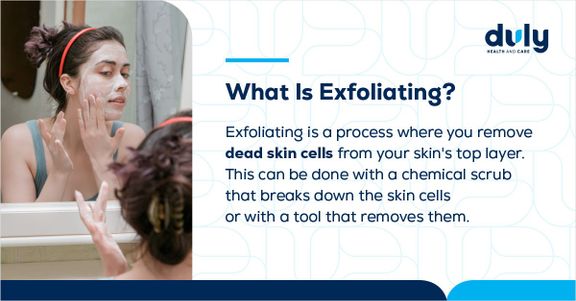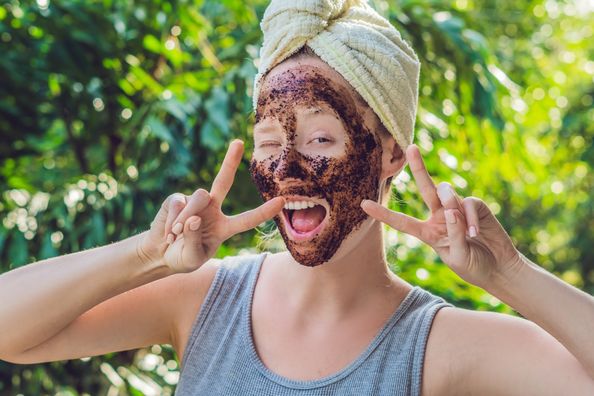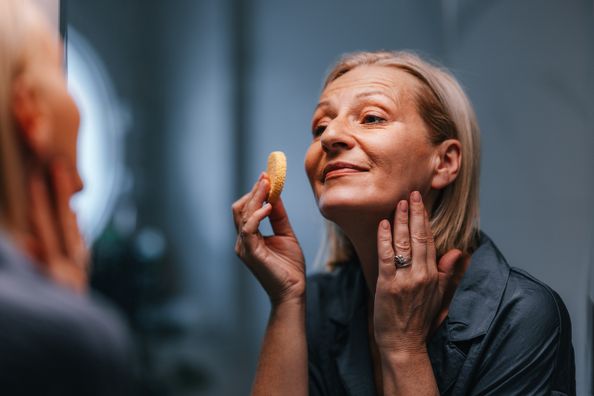Cleanse, tone, moisturize, spot treat… If you feel like skincare routines are only getting more complicated, you’re probably not the only one. From Instagram to TikTok to Facebook, there seem to be countless videos — and countless steps — to help you create the perfect skincare routine.
One of the steps you may have seen is exfoliating.

Source: American Academy of Dermatology Association
Exfoliating can be a helpful tool in many people’s skincare routines. By exfoliating your skin, you can help other products you use work more effectively because they can get deeper into your skin. Exfoliation peels which can be done by a dermatologist, can help with a range of skin conditions like photoaging caused by the sun, melasma or hormonally induced dark spots and discoloration after acne scars.
But exfoliating too much can rub your skin raw, cause additional pigmentation or cause sensitive-skinned people to react poorly.
Knowing that there are pros and cons to exfoliating can help you make a decision that works best for your skin. If you decide to add exfoliation to your skincare routine, here are a few things to remember to help you do so properly and safely.
Moisturize After Exfoliating
If you do choose to use an exfoliating product, make sure that’s not the only step in your skincare routine. You don’t necessarily need to do a 12-step regimen, but exfoliating can dry out your skin, and you’ll want to be sure to follow up with moisturizer as well.
Now, some steps in your skincare routine may be done more often than others. Putting sunscreen on your face and body is a great habit to get into every day to prevent skin cancer and premature aging. If you wear makeup, be sure to clean your face in the morning and at the end of each day. Daily moisturizing also helps your skin stay healthy and hydrated. Exfoliation, on the other hand, doesn’t need to be done every day.
Granular exfoliants, like beads or even natural scrubs, can sometimes be too harsh, and using them too often can leave your skin dry, raw, or red. If you notice this, try exfoliating less often, like every 4 days instead of every other day.
Your exfoliating routine should be based on your specific skin type as well as the type of exfoliating you are doing. You can exfoliate with a chemical substance or with a tool like a sponge, brush or device. A Duly dermatologist can help you figure out what combination of methods or products might work best for your skin.
Skincare isn’t one size fits all — even if social media makes it seem that way. If you have questions about your skin or skincare routine, schedule time to talk with a Duly board-certified dermatologist.
Watch Out For Your Eyes
If you’ve ever gotten soap or shampoo in your eyes, you’re probably familiar with that burning sensation. Your eyes might water, turn red, or even become itchy when you get something in them that’s not supposed to be there.
While soap in your eyes might usually be just an annoyance, it’s even more important to watch out for your eyes when exfoliation is involved. Gritty, exfoliating substances — whether man-made or natural (like sugar, walnut shell powder, or coffee grounds) — can be dangerous to your eyes.
These kinds of scrubs can scratch or tear your cornea, so take extra care when washing your face.
If you do get an exfoliant in your eyes, don’t panic. Follow these simple steps to help with symptoms:
- Immediately rinse your eyes with clean, cold water.
- Avoid rubbing your eyes.
- Call your eye doctor if any symptoms like burning or itching don’t go away.
Not All Exfoliating Products Are The Same
When you hear the word “exfoliate,” you might think about plastic microbeads — and you may have heard that microbeads are bad and were banned in 2015. This is not because they are damaging to your skin, but because they are bad for the environment.
Specifically, the Microbead-Free Waters Act of 2015 bans plastic microbeads in rinse-off cosmetic products to keep them out of the water where they could be consumed by marine life.
Plastic microbeads aren’t the same as all gritty or chemical exfoliating scrubs. If your face scrub feels crunchy in your hands, it won’t have plastic microbeads in it if it was sold after 2018. That scrubby feeling can be produced with natural items like sugar and other ingredients. If you’re worried about the environment, the Microbead-Free Waters Act of 2015 has made it so you can exfoliate guilt-free.
Recommended products and treatments include:
Make Skincare Choices That Work For You
Everybody’s skin is unique, and exfoliating isn’t for everyone. There’s no one single way to approach skincare, and everyone’s routine will look different. Just because someone has a million followers on Instagram doesn’t mean they know everything about skincare. Or they may know everything about skincare, but their routine still may not be a good fit for you.
The best approach to skincare is one that fits your skin type, lifestyle, and budget. If you only have 5 minutes in the morning to get ready for the day, that’s okay. There are many ways you can make maintaining your skin’s health a part of your daily routine. Talk to your Duly provider or dermatologist about your goals, and they can make recommendations for products that fit them.
Health Topics:








